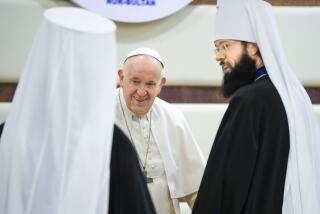What the Continent Needs Is a Soul : Europe: The Pope and the Soviet leader will meet as partners in a common cause: the evolution of a new world from the Atlantic to the Urals.
- Share via
Mikhail Gorbachev will meet fellow media superstar John Paul II in Rome this week as a prelude to talks with George Bush. Thus the military, political and symbolic leader of the Warsaw Pact will visit the two Western leaders who can most contribute to the long-term stability of Central and Eastern Europe and to the formation of a new Europe from the Atlantic to the Urals.
While a single interlocutor suffices for the East, the West must be represented by at least two different types of leaders. The American President’s job description does not include the kind of “spiritual” leadership demanded from the head of a Leninist party (Whether Bush lacks his predecessor’s charisma is irrelevant to this point.) John Paul’s legitimacy as the West’s symbolic leader on Central and Eastern Europe results from the Roman Catholic majorities and pluralities in many NATO and Warsaw Pact states and from his strong support for individual and political rights, beginning with his inspirational first papal trip to Poland in 1979.
The challenges of political stability and the future of Europe are primarily cultural and religious, secondarily military. The current devolution of the Soviet empire results from the failure of Communist parties to maintain legitimacy, not from military or diplomatic debacle. Support--and often space--for discussion of alternative sociopolitical structures was provided by churches. For example, the Lutheran church has been encouraging democratization in the German Democratic Republic.
Building a new Europe will demand much higher levels of trust among states and among ethnic groups. In his recent trip to Poland, West German Chancellor Helmut Kohl attended mass with Prime Minister Tadeusz Mazowiecki and visited Auschwitz with Rabbi Pinchas Joskowicz, seeking to symbolize German reconciliation with Poles and Jews. The reconciliation of these two victim groups may be even more sensitive than their reconciliation with the Germans, as Polish-Jewish conflict over the convent at Auschwitz has demonstrated.
Mikhail Gorbachev and Karol Wojtyla (John Paul II) share the widespread fear of nationalist ethnic chaos in Eastern Europe and the Soviet Union. In this nightmare, Eastern Europe would become a Yugoslavia writ large, held together only by military force. And, as in Yugoslavia, religious differences would reinforce ethnic hatreds. Since the early 1960s, when the Vatican adopted an Ostpolitik like West Germany’s, Popes have discouraged ethnic nationalism, to the displeasure of Croatian Catholics, among others.
The Vatican also has participated actively in the Helsinki process. Now, with Gorbachev willing to legitimize Ukrainian Uniate Catholics and permit fuller human rights in Eastern Europe, the superpowers and the Vatican have a duty to facilitate a stable period of transition.
On the more difficult question of Europe’s future, Bush must be limited to the subsidiary role of encouraging Europeans to find common ground. What the continent lacks is a soul. Where will the new European political and cultural consensus come from? Certainly not from ideologically bankrupt Marxism, however humanized, nor from the exaggerated individualism of the American system which glorifies commercialism and consumerism.
In the Polish Pope’s vision, Jews and Eastern Europeans have received through the suffering of Auschwitz and the Gulag a sacred “mission” to mediate the spiritual reunification of Europe. Wojtyla and Mazowiecki come from the same Krakow intellectual circles that advocated the secularization of politics and led the recent efforts for Polish-Jewish dialogue. But even this relatively enlightened perspective needs the complementary insights of Europe’s exponents of ecumenical tradition, the Dutch, with their strong emphasis on interreligious dialogue, ecclesiastical human rights, arms control, protection of the environment and European unification. The Dutch also show a healthy skepticism about the free-market economy as a moral panacea, however effective it may be at uprooting communist bureaucracies.
German reunification could thus occur slowly as Europe unifies through the continuing continental dialogue about such Polish and Dutch virtues. Europe will develop its soul as it faces immediate inside crises like economic solidarity with Eastern Europe, and outside crises like Third World underdevelopment. In this sense, the murder of the Jesuits in El Salvador presents a challenge to the European soul as it does to the American.
Commenting on John Paul II’s third trip to Poland, in 1987, I wrote in these pages that he believed that “the road between Washington and Moscow could lead through Krakow and Kiev.” This road now extends through the Brandenburg Gate. By encouraging stability and future trust, the meeting between Gorbachev and Wojtyla could contribute to better East-West relations, making Europe an inspiration for global “justice, peace and the integrity of creation” (the European ecumenical theme).
More to Read
Sign up for Essential California
The most important California stories and recommendations in your inbox every morning.
You may occasionally receive promotional content from the Los Angeles Times.










